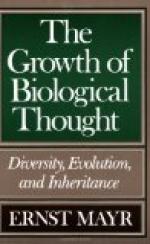But if we should allow to some of the more enlightened Gentiles of antiquity, some degree of political wisdom; we might still look in vain for their progress in that estimation of temporal wealth, which reveals our community of interests, thus divesting self-love of its hatefulness, by training it to its best satisfaction. Historically, we every where find self-love too blind, freakish, springing upon immediate results, too envenomed with maliciousness to calculate prudently.
3. Religion affords altogether the readiest, shortest, directest way to the conclusion, that interest and duty most coincide. It brings the man of humblest intellectual attainments at once to the conclusion, which the prudent calculator may reach, after long research and extensive induction of particulars; namely, that he cannot add ultimately to his own stock of enjoyment, by detracting from another’s share. What might seem prudence at the expense of justice and benevolence, may assume a contrary aspect, at the first flush of conviction, that another life shall rectify the inequalities of this.
Philosophy, having done its best at showing the interest of each in the welfare of all, and how much would redound to the happiness of all if all heartily concurred in thus regarding life, still labors at the question, as the world goes, how the individual will fare, who takes a course so different from the general current, as to devote his best zeal to bettering the condition of that world, which will be likely so little to appreciate his devotion. So that, as matter of fact, one is little likely to see first (in earnestness) the reign of righteousness, as the best security for the necessaries and conveniences of life, unless in the faith which apprehends, that “all these things shall be added” to those thus devoted to promoting the holy cause of humanity.
4. Again; to the great majority of mankind, religion is the best spur to the understanding, towards the conclusions of a just prudence. “The entrance of the word giveth understanding to the simple,” says the Psalmist. How often have we found its so! How often the first impulse to intellectual activity is given by the man’s religious interest! How often they, in whom a taste for reading could never be formed otherwise, begin to read for satisfying their spiritual wants, and so develop mental powers which else had ever lain dormant.
If we mark those extremes of social humanity, the masses of Hindostan and the people of New England—the monotonous stagnation there, and the progressive enterprize here—we see a difference mainly attributable to a religion whose very spirit is, forgetting the things behind, and pressing onward to the things before. And, though this spirit may not always go forth in accordance with the teaching of that religion, it is none the less true, that such was its source; mind being awake, enterprising, on the track of improvement, only where a lively faith in Christianity has kindled the flame. Every where else, policy at best presses so hard on the subject individuals, as tolerably to restrain the passions from breaking out of one against another. Only “where the spirit of the Lord is,” ventured the experiment, of making the pressure on each so light, as to become the best security for his keeping in place.




